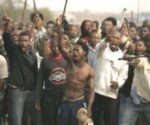How Sanusi, Soludo Created Foreign Exchange Crisis-CBN Governor
LAGOS SEPTEMBER 20TH (URHOBOTODAY)-Mr. Godwin Emefiele, governor of the Central Bank of Nigeria (CBN), has blamed Lamido Sanusi and Professor Chukwuma Soludo- his predecessors for the current foreign exchange crisis in the country.
Emefiele said the current forex crisis would have been averted if Soludo and Sanusi had not adopted measures that resulted in the depletion of the country’s foreign reserves, according to a report in National Mirror.
Soludo was CBN governor between 2004 and 2009 when Sanusi succeeded him.
According to Emefiele, when both men were at the helm of affairs at the apex bank, the price of oil was consistently well above $110 per barrel and the country had healthy reserves that would have allowed it to invest in critical infrastructure that would boost productivity and diversify the economy.
He said: “In September 2008, Nigeria’s FX reserve stood at $62 billion, what did we do with $62 billion? At a time when crude oil price was at about N120 per barrel, what did the country do? What we could have done is save the money. If we couldn’t save the money, invest it in infrastructure, invest in industry; invest them in infrastructure and industry that would grow productivity and the wealth of our people.
But what did we do? “I’ll give you an example. The Central Bank of Nigeria of that time went about licensing class ‘A’, class ‘B’, class ‘C’ bureaux de- change. “For class ‘A’ bureaux de- change, Central Bank was allocating $1 million per week; for class ‘B’ bureaux de- change, Central Bank was allocating $750,000 bureaux de- change to the extent that between 2005 when the bank started selling dollar cash and 2016 January when we stopped it, the CBN had sold dollar cash of up to $66 billion to BDCs.
“In 11 years, CBN allocated $66 billion, averaging $6 billion per year. If this didn’t happen, we would comfortably be having well over $90 billion in our reserve account today and we will not be struggling to pay our bills today. If we had thought of other ways to utilise our reserves in 2008 when it was as high as $62 billion, perhaps certainly we would not be where we are.”
He revealed that when he was CEO of Zenith Bank, he was queried by a Deputy Governor of the CBN for not selling dollars to BDCs. “I was called to be queried that some people in Kano, some people in Port Harcourt and in Lagos were calling to say Zenith Bank was not selling dollar cash to bureaux-de change, but of course the bank didn’t see any serious need to disburse dollar cash to bureaux-de-change at that time.
That was what we did with part of our $62 billion,” he stated. Besides, he said in the wake of the global financial crisis, all forms of capital control were removed to encourage the flow of capital into Nigeria with the result that between 2009 and 2014, the country recorded $23 billion in capital flows.
However, according to him, although CBN’s policies at the time encouraged Nigerians to buy shares/securities abroad, there was no record that the dividends and proceeds of sale of the shares were repatriated through the apex bank.
He said: “Between 2009 or 2010 and 2014, when we had the crisis, America pumped a lot of money to stimulate the economy, and as a result of pumping that money, some of those funds flowed into emerging markets, including Nigeria.
At that time again, Nigeria removed all forms of capital control to encourage the flow of capital into Nigeria. So what happened during that time? In five straight years, we saw crude price at above $105 per barrel for five straight years.
“That period, we also saw unhindered flow of capital into emerging market into Nigeria; to the extent that by 2013, we had $23 billion in capital flows into Nigeria. What did we also do? The CBN started encouraging Nigerians to buy shares/ securities abroad.
Although the dividends and proceeds of sale of the shares were to be repatriated through the CBN, we do not have any records to show that the dividends and proceeds of share sale were repatriated. People just had all the discretion to transfer funds as they wished; just because we thought we had a lot and didn’t think about a day like today when crude prices will be so low.
We should have, at that time, built our reserves. What did we do with our reserves at that time? I repeat those were some of the actions we took as Central Bank that resulted in the situation that we are today.” The CBN Governor, who stoutly defended the regulator’s forex policy, especially the forex ban on 41 items, said that the country could not afford to be importing items it has the capacity to manufacture, stressing that the forex ban had already led to the creation of jobs in some sectors.
Commenting on the strategies that can get the country out of the economic recession, Emefiele again, suggested that the government sell assets in the oil industry just as Africa’s richest man, Aliko Dangote, suggested. ‘
He said: “In April 2015, I granted an interview to Financial Times of London where I suggested that in order to raise money to fund its capital expenditure, government needed to sell between 10 per cent and 15 per cent of its oil and gas assets.
At that time, oil price was about $50/N55 per barrel, and our consultants did the numbers and told us that we could raise between $25 to $35 billion.
I would imagine that that option is still on the table because more people even in the cabinet have made the same suggestion and if it happens, that will be fine, including the option to buy back the assets at some premium if we contemplate buying back when the crude prices move up and the assets value also move up.
You know that in government, there are those against and those in favour. The argument in favour of selling the assets has gained a lot of credence recently.” The country’s foreign reserves stood at $24.87 billion as at September 15.





















